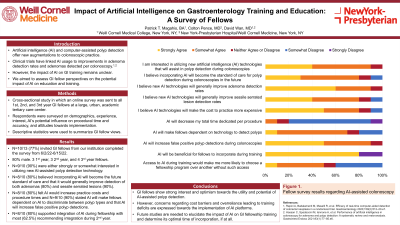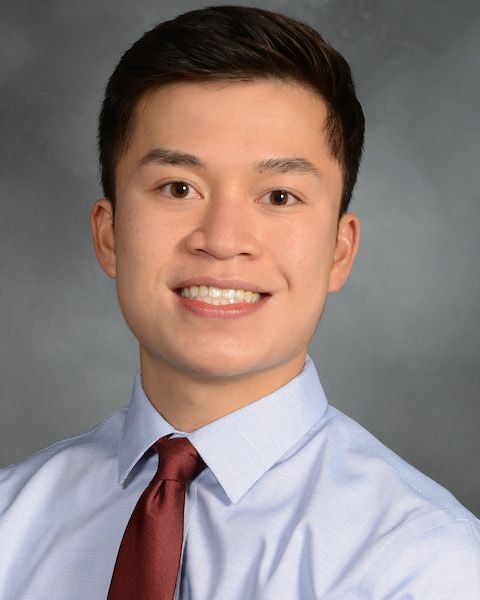Tuesday Poster Session
Category: General Endoscopy
P3401 - Impact of Artificial Intelligence on Gastroenterology Training and Education: A Survey of Fellows' Perspectives
Tuesday, October 24, 2023
10:30 AM - 4:00 PM PT
Location: Exhibit Hall


Patrick T. Magahis, BA
Weill Cornell Medicine
New York, NY
Presenting Author(s)
Patrick T.. Magahis, BA1, Colton J. Pence, BS, MD2, David Wan, BS, MD1
1Weill Cornell Medicine, New York, NY; 2New York-Presbyterian/Weill Cornell Medical Center, New York, NY
Introduction: Artificial intelligence (AI) and computer-assisted polyp detection are promising augmentations to endoscopic practice. Clinical trials have linked AI usage to improvements in adenoma detection rates and adenomas detected per colonoscopy. While previous studies have demonstrated generally positive physician sentiments, AI’s effect on gastroenterologist (GI) training is unclear. We aimed to assess GI fellow perspectives on the potential impact of AI on training.
Methods: This was a cross-sectional study in which an online survey was sent to 1st, 2nd, and 3rd year GI fellows at a large, urban, academic tertiary care center. Respondents were surveyed on demographics, experience, interest, AI’s potential influence on endoscopy, and attitudes towards implementation. Descriptive statistics were used to summarize their views.
Results: A total of 10 invited GI fellows at our institution completed the survey June 2022. Fellows were 80% male and consisted of 3 in their 1st year, 3 in their 2nd year, and 4 in their 3rd year. The majority (60%) had previously used AI platforms. Nine (90%) stated they were interested in using new AI technologies to assist in polyp detection during colonoscopies. There was strong support towards the utilization of AI with 80% of fellows reporting they believe incorporating AI will become the future standard of care and that it would improve detection of adenomas (80%) and sessile serrated lesions (90%). Fellows placed emphasis on validation from AI during colonoscopies; 80% reported they would feel comfortable leaving behind a polyp perceived as hyperplastic by both endoscopic appearance and AI, but only 30% agreed when a polyp is perceived as hyperplastic by appearance but not by AI. Conversely, 80% of fellows felt AI would increase practice costs and procedure times, 90% stated AI is likely to make fellows dependent on technology to discriminate between polyp types, and 90% believe AI will increase false positive polyp detections. Eight (80%) supported the integration of AI technology during fellowship with most recommending integration during the second year.
Discussion: GI fellows show strong interest and optimism towards the utility and potential of AI-assisted polyp detection. However, cost barriers and overreliance leading to training deficits are concerns regarding implementation of AI platforms. Future studies may further elucidate the impact of AI on GI fellowship training and determine optimal time of incorporation, if at all.

Disclosures:
Patrick T.. Magahis, BA1, Colton J. Pence, BS, MD2, David Wan, BS, MD1. P3401 - Impact of Artificial Intelligence on Gastroenterology Training and Education: A Survey of Fellows' Perspectives, ACG 2023 Annual Scientific Meeting Abstracts. Vancouver, BC, Canada: American College of Gastroenterology.
1Weill Cornell Medicine, New York, NY; 2New York-Presbyterian/Weill Cornell Medical Center, New York, NY
Introduction: Artificial intelligence (AI) and computer-assisted polyp detection are promising augmentations to endoscopic practice. Clinical trials have linked AI usage to improvements in adenoma detection rates and adenomas detected per colonoscopy. While previous studies have demonstrated generally positive physician sentiments, AI’s effect on gastroenterologist (GI) training is unclear. We aimed to assess GI fellow perspectives on the potential impact of AI on training.
Methods: This was a cross-sectional study in which an online survey was sent to 1st, 2nd, and 3rd year GI fellows at a large, urban, academic tertiary care center. Respondents were surveyed on demographics, experience, interest, AI’s potential influence on endoscopy, and attitudes towards implementation. Descriptive statistics were used to summarize their views.
Results: A total of 10 invited GI fellows at our institution completed the survey June 2022. Fellows were 80% male and consisted of 3 in their 1st year, 3 in their 2nd year, and 4 in their 3rd year. The majority (60%) had previously used AI platforms. Nine (90%) stated they were interested in using new AI technologies to assist in polyp detection during colonoscopies. There was strong support towards the utilization of AI with 80% of fellows reporting they believe incorporating AI will become the future standard of care and that it would improve detection of adenomas (80%) and sessile serrated lesions (90%). Fellows placed emphasis on validation from AI during colonoscopies; 80% reported they would feel comfortable leaving behind a polyp perceived as hyperplastic by both endoscopic appearance and AI, but only 30% agreed when a polyp is perceived as hyperplastic by appearance but not by AI. Conversely, 80% of fellows felt AI would increase practice costs and procedure times, 90% stated AI is likely to make fellows dependent on technology to discriminate between polyp types, and 90% believe AI will increase false positive polyp detections. Eight (80%) supported the integration of AI technology during fellowship with most recommending integration during the second year.
Discussion: GI fellows show strong interest and optimism towards the utility and potential of AI-assisted polyp detection. However, cost barriers and overreliance leading to training deficits are concerns regarding implementation of AI platforms. Future studies may further elucidate the impact of AI on GI fellowship training and determine optimal time of incorporation, if at all.

Figure: Figure 1. Fellow survey results regarding AI-assisted colonoscopy
Disclosures:
Patrick Magahis indicated no relevant financial relationships.
Colton Pence indicated no relevant financial relationships.
David Wan indicated no relevant financial relationships.
Patrick T.. Magahis, BA1, Colton J. Pence, BS, MD2, David Wan, BS, MD1. P3401 - Impact of Artificial Intelligence on Gastroenterology Training and Education: A Survey of Fellows' Perspectives, ACG 2023 Annual Scientific Meeting Abstracts. Vancouver, BC, Canada: American College of Gastroenterology.
